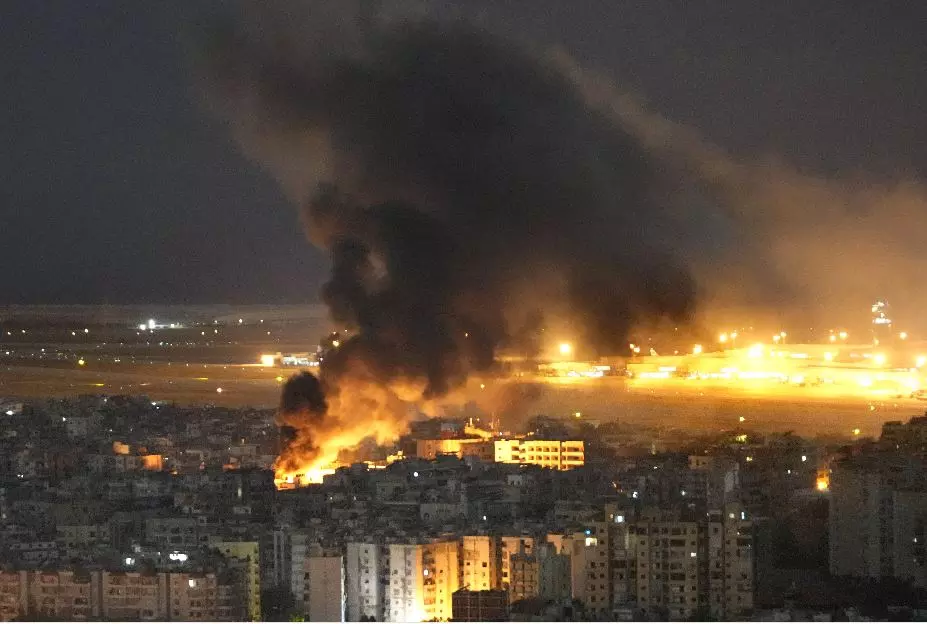Israel begins strikes on Beirut targeting Hezbollah’s financial arm

Beirut: Israel’s military on Sunday announced a campaign targeting Hezbollah’sfinancial operations, specifically focusing on al-Qard al-Hassan, a key financial unit for the Iran-backed group. Explosions were reported in southern Beirut shortly after the announcement, leading to evacuation warnings for southern Beirut, the eastern Bekaa Valley, and parts of southern Lebanon. Despite the strikes, Lebanon’s only airport continued to operate, as footage captured by AP showed.
According to a senior Israeli intelligence official, the strikes aim to dismantle al-Qard al-Hassan's operations throughout Lebanon. This organisation functions as a financial network for Hezbollah, helping to pay operatives and procure arms. Sanctioned by the U.S. and Saudi Arabia, al-Qard al-Hassan is a registered nonprofit that also provides financial services to ordinary Lebanese. Its Arabic name translates to “the benevolent loan,” highlighting its role in strengthening Hezbollah’s support among the Shiite population in a country where state institutions have struggled in recent years.
David Asher, an expert on illicit financing and a senior fellow at the Hudson Institute, emphasized the significance of these strikes. He noted that al-Qard al-Hassan is cash-based, meaning its financial operations could be severely disrupted by such attacks. The organization has substantial accounts with major Lebanese banks, and its ability to operate effectively may be compromised.
In response to the Israeli strikes, al-Qard al-Hassan released a statement, asserting that the decision to target it reflects Israel’s “bankruptcy.” They assured clients that measures were in place to safeguard their funds. Following the announcement, there was a noticeable exodus of people from areas surrounding its branches in Beirut.
The military actions escalated panic in the region, exacerbated by an erroneous evacuation notice from the Israeli military, which mistakenly identified a target as Grand Cinema ABC Verdun, a theater located over 10 kilometers away from the intended target in an upscale shopping mall in central Beirut.
The first moments of the israeli aggression on Beirut southern suburb pic.twitter.com/8H3eF5PVCb
— Pheebo🪐 (@galpalpheebs) September 27, 2024 ">Also Read:
Tensions between Israel and Hezbollah have risen dramatically in the past year, particularly with frequent cross-border fire linked to the ongoing conflict in Gaza. This escalation turned into all-out warfare last month when Israel deployed ground troops into Lebanon.
Israel's announcement came shortly after U.S. Defense Secretary Lloyd Austin expressed concerns over civilian casualties in Lebanon, urging Israel to minimize strikes, especially in populated areas like Beirut.
In the latest developments, the Lebanese army reported that three of its soldiers were killed in an Israeli strike on their vehicle. The Israeli military has not commented on this specific incident but confirmed it has targeted over 100 Hezbollah sites in southern Lebanon within the past day.
The Lebanese army has remained largely sidelined in this conflict, unable to exert control over Hezbollah or effectively defend against Israeli incursions. In retaliation, Hezbollah reportedly launched more than 170 rockets into northern Israel on the same day, leading to minor injuries among civilians in Safed due to a fire sparked by one of the rocket attacks.
Meanwhile, the U.N. peacekeeping mission, UNIFIL, reported that Israeli forces destroyed an observation tower and a perimeter fence of a U.N. position in southern Lebanon, despite pressure to withdraw from their posts.
The ongoing conflict is further complicated by Iran’s support for Hezbollah, and the U.S. is currently investigating a leak of classified documents suggesting Israel was mobilizing military assets in response to Iran's ballistic missile attacks on October 1.
In Gaza, the humanitarian situation remains dire as Israeli airstrikes continued, reportedly killing at least 87 people and leaving many missing. The Israeli military stated these operations targeted Hamas militants regrouping in northern Gaza, with significant destruction reported in the town of Beit Lahiya, where a multistory building and nearby homes were flattened.
As the situation evolves, the U.S. has been urging both Israel and Hamas to pursue a ceasefire following the recent killing of Hamas leader Yahya Sinwar. However, both sides remain locked in conflict, with no signs of de-escalation on the horizon.

